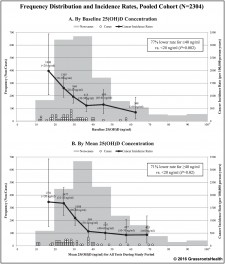Vitamin D and Cancer-Preventing Properties

LOS ANGELES, November 21, 2017 (Newswire.com) - Making Sense of Different Studies Regarding the Cancer-Preventing Role of Vitamin D:
There are a lot of conflicting research papers, published information and large clinical studies on vitamin D and cancer prevention where the results differ. Pouring through this data, the average person would understandably be confused trying to determine whether vitamin D does - or does not - help with preventing cancer. On top of that, many studies are in fact non-conclusive. Enter Robert Gadimian, owner of Rophe Pharma, who tries here in this article to make sense of the contradictory and confusing research assessments. In order to explain and summarize the available information pertaining to cancer-preventing properties of vitamin D, Gadimian collects the most relevant results from the following scientific studies looking into:
Robert Gadimian, owner of Rophe Pharma, who tries here in this article to make sense of the contradictory and confusing research assessments. In order to explain and summarize the available information pertaining to cancer preventing properties of vitamin D.
Robert Gadimian, Owner of Rophe Pharma
- sun exposure and compared people who live in areas of the world where there is a lot of sunshine versus people who lived in areas of the world with less sun exposure
- correcting the vitamin D deficiency (mostly in the people who lived in areas with less sun exposure) and try to study if correcting vitamin D deficiency by providing vitamin D as a supplement had any impact on developing cancer
- people who took low doses of a vitamin D supplement versus people who did not take any supplement
- high and low doses of vitamin D (1000 IU versus 400 IU, respectively) to study whether there was any difference between these groups in terms of the development of cancer.
After reading through these studies, Gadimian says it becomes obvious that correcting vitamin D deficiency is helpful for overall health but has no or minimal impact on prevention of cancer development. Things become more interesting in the studies where low and high doses of vitamin D were studied. In these studies, you start to see some cancer-preventing effects of vitamin D - although in some studies the results are not statistically significant. This all leads Gadimian to wonder what was the reason that only some studies showed vitamin D cancer-preventing properties but not all the studies, and so he decided to look closer into the studies and it seems he may have found an answer.
It May Be How You Metabolize Vitamin D that is Most Important, Not the Dose
The key in obtaining the cancer-preventing properties of vitamin D is how much of its active metabolite you will actually get in your body (blood).
The fact is that vitamin D converts to 25(OH)D (a vitamin D metabolite) after we ingest it. The cancer-preventing properties of vitamin D seem to be directly correlated to the level of 25(OH)D in your blood. This was evaluated and proved in a large study with 2,230 subjects conducted by McDonnell and company (Reference 1) where they showed that blood concentration level above 40 ng/ml of 259(OH)D is directly correlated to cancer prevention.
As evident from Figure 1, the higher the level of 25(OH)D, the lower the frequency of cancer. It also shows a stunning 77 percent reduction of cancer frequency when the blood concentration of 25(OH)D is above 40 ng/ml. It even showed that blood levels above 40 ng/ml have a more cancer-preventing effect.
Figure 1:
Correlation Between 25(OH)D (X axis) and Cancer Frequency (Y-axis)
How Much Vitamin D to Take?
So, the question becomes, how much vitamin D should we take to get blood levels of 40 ng/ml and higher?
The answer is, at minimum, 1,000 IU per day.
Every person is different and so we metabolize vitamin D differently. This explains why people who took 1,000 IU vitamin D in the clinical studies had different results since their 25(OH)D levels were different. To be sure, you can check your blood concentration so that you know if you are getting the right amount. Vitamin D is relatively safe, so you can consume up to 2,000 IU per day and still be fine.
Last, but not least, take vitamin D that comes in the form of cholecalcifenol. You can find it in any store that carries supplements.
Reference
1- PLoS One. 2016 Apr 6;11(4):e0152441. doi: 10.1371/journal.pone.0152441.
Source: Robert Gadimian - Owner of Rophe Pharma